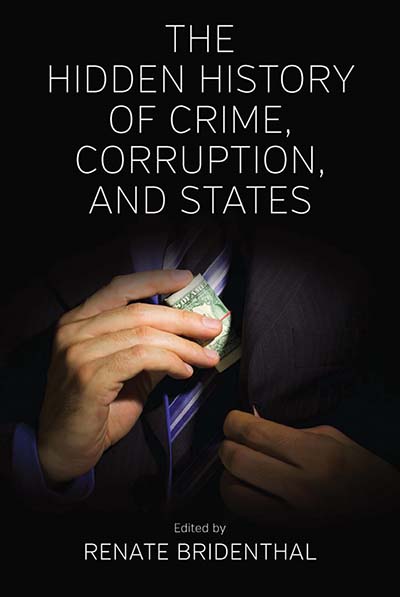In the past, the world’s political economy has not always been built through honorable dealings. In fact, not much may have been, according to the recently published volume The Hidden History of Crime, Corruption, and States, which sheds light on such shadowy parts of economic history. Below, editor Renate Bridenthal develops this idea to share how those in power and those illicitly taking power may not be so different after all.
____________________________________

A specter is haunting history. The ghostly presence of economic crime as political power has been all but absent in history writing, but not in history itself.
Like dark matter, its synergy has been palpable if not always visible. Yet in our time, more and more emerges from the shadows, exposed in newspapers and tried in courts, and compels us to consider the history of the illicit political economy and its effects in past and present.
Here we venture to do so by specific examples. Three concepts – crime, corruption and states – all hard to define and historically variable, are examined by ten authors writing about different places in different epochs. Our claim that there is a hidden history in the history of states and state-making refers to the fact that most established narratives do not analyze how lawmakers and lawbreakers have been intrinsically connected, indeed dialectically involved in shaping each other.
From Augustine’s observation in the fourth century that kingdoms and robber bands were essentially the same, we have been aware of the similarity of these forces. Yet historians have tended to write more respectable stories about the formal development of states and the overt challenges to them, such as revolutions. They have not acknowledged economic crime, which so easily and amorally changes sides, as having a bearing on significant historical transformations. Too often described as a marginal phenomenon, or a shadow that accompanies important political events, it becomes nearly weightless ephemera or material for novelists.
A closer look reveals a more frightening duality in which opposite sides of law interact, indeed at times mutually support each other. When corruption appears to stabilize states, when smuggling builds national economies, when the criminalization of cultural traditions serves imperial exploitation, when the illegal activities of diasporas support their states of origin, when states resort to breaches of their own laws in order to maintain or transform themselves, then we see how ambiguous the relationship between the state and criminal enterprises can be and how they mutually constitute each other.
Current reported events have brought this knowledge more forcefully to our attention. These days, there are almost daily headlines about corruption in governments, international trafficking of goods and people, and financial trickery. Piracy, once romanticized as historical adventure, has returned dramatically in the Indian Ocean. Drug traffickers supply both sides of civil wars as well as their customers. Purveyors of sex workers and of other kinds of laborers bring people from poor countries to serve illegally in richer ones. “Creative accounting” by financial institutions has bilked hundreds of thousands of people of their pensions, savings and homes.
Today’s huge changes in production, distribution, finance, and all the social relations involved with a global economy challenge our notion of state sovereignty. But since we are ourselves the product of our times, these themes now urgently demand historical analytical attention. Here we examine the hugely vibrant, politically powerful underbelly of capitalist development over time.
_____________________________________
Renate Bridenthal is Emerita Professor of History at Brooklyn College, The City University of New York. She has co-edited and contributed to many publications including, Becoming Visible: Women in European History (1977, 1987,1998), When Biology Became Destiny: Women in Weimar and Nazi Germany (1984), The Heimat Abroad: The Boundaries of Germanness (2005), Interactions: Transregional Perspectives on World History (2005), and Seascapes: Littoral Cultures and Transoceanic Exchanges (2007).
